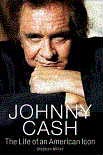|
Hold on to your hats! We are about ready to be slammed by a tidal wave of biographies on Johnny Cash. The first was Man in Black, an autobiography published in the 70s. Next, we have the autobiography Cash wrote with the help of Patrick Carr. This book was a response to the resurgence in Cash’s career brought about by his incredible work with Rick Rubin. Why do readers need to bother with any more biographies about Cash? Well, the answer to that question is that these biographies by those writers outside of the Cash inner circle will hopefully be able to answer questions about Cash’s career that the man himself didn’t feel the need to. In Cash’s autobiographies, he revealed many of his faults to his fans, but he didn’t always bother to tell what happened to his life and career when fame wasn’t so kind to him. This is where Stephen Miller succeeds in his biography on Cash. Miller doesn’t give the readers any new dirt on Cash (Cash was honest to his own detriment), but instead, he fills in chronological gaps on Cash’s career like the time period between the mid to late 70s until Cash began his work with Rubin. Miller covers Cash’s life with the respect Cash deserved, but without having to eliminate any information at the request of the family or powerful Cash friend. Miller tells the story of Johnny Cash without letting his own writing get in the way. I find that biographies often are nothing more than re-arrangements of an artist’s past interviews, or an attempt by the writer to promote his style of writing while trying to tell someone’s life story at the same time. Luckily, Miller seems only concerned with the intent of the book. Telling the story of an American icon who will not be forgotten for years to come.
|
 Johnny Cash: The Life of an American Icon
Johnny Cash: The Life of an American Icon